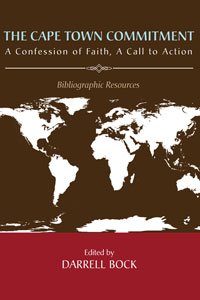
The Cape Town Commitment commanded attention in seminaries and universities on its release, and it soon became clear that teaching material would be required, to enable a deep study of its content and application. To this end, in mid-2012 bibliographic resources, arranged by topic, were posted online. Wipf and Stock has now published this material as a trade title, for use in graduate-level courses, and for academic libraries. This went on sale in July.
The Cape Town Commitment Bibliographic Resources, edited by Darrell Bock of Dallas Theological Seminary, is compiled by specialists drawn globally in a range of fields. The book, presented in modules, to form a teaching curriculum for Masters students, will be of equal use to research students. It is believed to be the first such bibliography of its kind in the book trade.
Welcoming the publication, David Sang-Bok Kim of Torch Trinity Graduate University in Seoul said he believes this will now be regarded as a ‘standard exposition’ of the Commitment. Samuel Logan, Director of the World Reformed Fellowship, urged that it and the Commitment ‘together belong in every seminary and Bible college curriculum and in every evangelical church library in the world.’
The Cape Town Commitment stands in the historic line of The Lausanne Covenant (1974) and The Manila Manifesto (1989). John Stott served as chief architect of the first two, and Chris Wright, International Director of Langham Partnership, chaired the Cape Town 2010 Statement Committee. Recommended class readers for students are the formal record of the Congress, Christ our Reconciler: Gospel/World/Church (ed J E M Cameron, IVP) and The Cape Town Commitment Study Edition (by Rose Dowsett, Hendrickson).
Julia Cameron, Lausanne Director of Publishing, said, ‘We are delighted to be partnering with Wipf and Stock The bibliography will be updated at regular intervals to encompass new titles, and it is hoped that later editions will include more works from majority world theologians. The listing, while largely evangelical, comprises books and papers considered worthy of academic study from a range of traditions.’
END
Related Links:
- View The Cape Town Commitment Bibliographic Resources Online
- Purchase The Cape Town Commitment Bibliographic Resources
